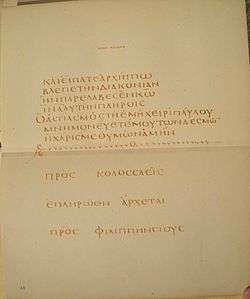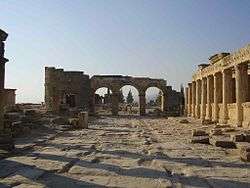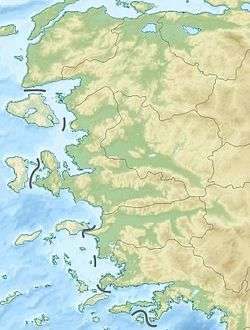Colossians 4
Colossians 4 is the fourth (and last) chapter of the Epistle to the Colossians in the New Testament of the Christian Bible. Traditionally, it is believed to be written for the church in Colossae by Apostle Paul, with Timothy as his co-author, while he was in prison in Ephesus (53-54 CE), although there were debatable charges that it is the work of a secondary imitator or that it was written in Rome (in early 60s).[1] This chapter contains the final exhortations and greetings.[2]
| Colossians 4 | |
|---|---|
 A page showing the Greek text of Epistle to the Colossians 4:17-18 (end) on Codex Claromontanus from ca. AD 550. | |
| Book | Epistle to the Colossians |
| Category | Pauline epistles |
| Christian Bible part | New Testament |
| Order in the Christian part | 12 |
Text
The original text was written in Koine Greek. This chapter is divided into 18 verses.
Textual witnesses
Some early manuscripts containing the text of this chapter are:
- Papyrus 46 (c. AD 200)
- Codex Vaticanus (325-350)
- Codex Sinaiticus (330-360)
- Codex Alexandrinus (400-440)
- Codex Ephraemi Rescriptus (c. 450; complete)
- Codex Freerianus (c. 450; extant verses 1-2, 11-13)
- Codex Claromontanus (c. 550)
Exhortations for masters
Verse 1
- Masters, give your bondservants what is just and fair, knowing that you also have a Master in heaven.[3]
Concluding Exhortations (4:2–6)
Verse 6
- Let your speech always be with grace, seasoned with salt, that you may know how you ought to answer each one.[4]
- "Let your speech be always with grace": that is, "in grace, or concerning grace"; let 'grace', such as 'the work of grace on souls', 'the wonders of grace' and 'the glory of the grace of God', be the subject of conversation among believers.[5] Moreover, the speech should be in a 'graceful way', that is, "always" with a cheerful face and in a courteous manner.[5]
- "Seasoned with salt": The Syriac version reads, "as if it was seasoned with salt". 'Grace' to 'speech' is as 'salt' to 'meat'; therefore "grace, prudence, and holiness", as 'salt' (Mark 9:50), make conversation about the grace and doctrines of God more acceptable to a spiritual man; and as salt preserves flesh from being bad, so grace along with speech makes it pure and good, which corresponds to Paul's view that nothing corrupt should proceed out of the mouths of believers (Ephesians 4:29).[5]
- "How you ought to answer": The Syriac and Arabic versions render it, "and know ye how" and make it to be a fresh exhortation to the believers to share the spiritual knowledge, that they may be able to respond properly and pertinently, with meekness and fear, for those asking a reason of the hope that is in them.[5]
Final Greetings (4:7–18)
.jpg)

In the beginning of the final greetings, Paul introduces the bearers of this epistle – Tychicus and Onesimus – in a 'chiastic pattern' (verses 7–9).[2] Six men who were with Paul at that time, excluding Timothy (the co-author of this letter), sent their greetings; five of these ('Jesus who is called Justus' is the exception) also sent their greetings to Philemon in a separate epistle.[6]
Verses 10–11
- 10Aristarchus my fellow prisoner greets you, with Mark the cousin of Barnabas (about whom you received instructions: if he comes to you, welcome him), 11and Jesus who is called Justus. These are my only fellow workers for the kingdom of God who are of the circumcision; they have proved to be a comfort to me.[7]
- "Aristarchus": is known from some references in the Acts of the Apostles (19:29; 20:4; 27:2).[6]
- "Mark": is mentioned multiple times in the New Testament: in Acts 12:12, 25; 15:37-39, and 2 Timothy 4:11.[6]
- "Who are of the circumcision": denoting the "Christians of Jewish origin".[6]
Verse 12
- Epaphras, who is one of you, a bondservant of Christ, greets you, always laboring fervently for you in prayers, that you may stand perfect and complete in all the will of God.[8]
Verse 13
- For I bear him witness that he has a great zeal for you, and those who are in Laodicea, and those in Hierapolis.[10]
- "Laodicea and ... Hierapolis": two neighboring cities of Colossae in the Lycus valley of Western Anatolia (Asia Minor, now Turkey),[11] in the land of Phrygia (Acts 2:10).[12] A population of 11,000 Jewish males is estimated to be in Laodicea in Paul's day, since Antiochus III placed a large colony of Jews to that area in 200 BC.[13]
Verse 14
- Luke the beloved physician and Demas greet you.[14]
Only from this verse Luke is known to be a doctor and based on the separation from the Jewish Christians mentioned in verse 11, he is identified as a "Gentile Christian".[15] It is noted in 2 Timothy 4:10 that Demas has left Paul for "this world".[15]
Verse 18
- This salutation by my own hand—Paul. Remember my chains. Grace be with you. Amen.[16]
- "By my own hand—Paul": Paul is known to regularly use amanuensis (secretaries) to write his letters (cf. Romans 16:22), so to authenticate these letters, he put his own handwriting in this last paragraph (cf. 1 Corinthians 16:21; Galatians 6:11; 2 Thessalonians 3:17; Philemon 19).[6]
References
- Murphy-O'Connor 2007, p. 1191–1192.
- Murphy-O'Connor 2007, p. 1197.
- Colossians 4:1 NKJV
- Colossians 4:6 NKJV
- John Gill's Exposition of the Entire Bible, - Colossians 4:6
- Murphy-O'Connor 2007, p. 1198.
- Colossians 4:10–11 NKJV
- Colossians 4:12 NKJV
- Moo, Douglas J. (2008). The Letters to the Colossians and to Philemon. Grand Rapids: William B. Eerdmans Publishing Company. p. 90. ISBN 9781844743414.
- Colossians 4:13 NKJV
- Bruce 1984, p. 3.
- Bruce 1984, p. 13–14.
- Witherington 2007, p. 109.
- Colossians 4:14 NKJV
- O'Brien 1994, p. 1276.
- Colossians 4:18 NKJV
Sources
- Bruce, Frederick Fyvie (1984). The Epistles to the Colossians, to Philemon, and to the Ephesians. The New International Commentary on the New Testament. 10 (revised ed.). Wm. B. Eerdmans Publishing. ISBN 9780802825100.
- Murphy-O'Connor, Jerome (2007). "70. Colossians". In Barton, John; Muddiman, John (eds.). The Oxford Bible Commentary (first (paperback) ed.). Oxford University Press. pp. 1191–1199. ISBN 978-0199277186. Retrieved February 6, 2019.
- O'Brien, Peter T. (1994). "Colossians". In Carson, D. A.; France, R. T.; Motyer, J. A.; Wenham, G. J. (eds.). New Bible Commentary: 21st Century Edition (4, illustrated, reprint, revised ed.). Inter-Varsity Press. pp. 1260–1276. ISBN 9780851106489.
- Witherington, Ben, III (2007). The Letters to Philemon, the Colossians, and the Ephesians: A Socio-Rhetorical Commentary on the Captivity Epistles. Wm. B. Eerdmans Publishing. ISBN 9780802824882.
External links
- Colossians 4 King James Bible - Wikisource
- English Translation with Parallel Latin Vulgate
- Online Bible at GospelHall.org (ESV, KJV, Darby, American Standard Version, Bible in Basic English)
- Multiple bible versions at Bible Gateway (NKJV, NIV, NRSV etc.)
